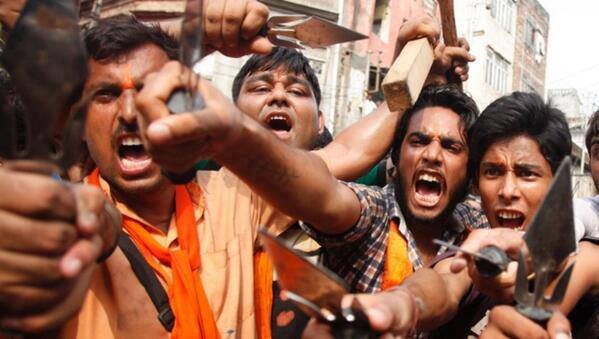Violence And Hatred In Indian Society
By Mahima Sukheja
23 October, 2015
Countercurrents.org

Somebody truly said; “Love has no gender. Love has no race. Love has no caste. Love has no religion, unless you come to India”. Here in this article, I don’t mean, love to be an instrumentalist concept; but is to be viewed in a largest context of humanity.
Of late, India has seen rising number of incidents marking intolerance towards a particular group; gender, caste, or a perspective. This intolerance doesn’t get limited to a war of words; but extends itself to taking liberty of taking away precious lives. In the past as well, there have been challenges to freedom of speech, expression and liberty; however, now there is a difference since communalism now tend to openly incorporate violence; being anti-democracy.
While on the one hand, it may be right to say, over 31.16% of the population has been urbanized, leading to fragmentation of rigid identities and intermixing of roles. Metro in Delhi is a perfect example; where seating arrangement, issuance of token system follows secular character. But, are we really free of the chains of the ties that have been passed to us from generations?
If women’s and tribal rights formed the part of the struggle in the nation in the 1970s and thereafter, the issue of “Who is a Hindu”; and relative conforming to the roles of Hinduism accordingly has taken forefront issue today. The killing of MM Kalburgi (Rationalist and a Secular voice), the lynching of a Muslim Man in Dadri in context of beef ban, the killing of Dalit children in lieu of revenge by the upper caste groups, and the Ghar Wapsi (Home Coming) Program are some of the incidents which reflect the changing fabric of Indian Society. Human life has become worthless in comparison with the ‘Holy Cow’. It is also to be noted that these incidents are just of the many; which may be held under the wraps and thus, may be going unreported.
The role of State and Society holds primary importance to view the values shaped amongst the citizens. If Swedish school attack, killing three persons and two hurt marked attention globally with their Prime Minister announcing the day as a “Dark Day for Swedish”, in India, we have one of our ministers making casteists and inhumane remarks; while attempting to delink the Central Government from the incident (Coincidently, the same political party exists at Centre and that particular State).
Romila Thapar noted Historian admits that until recently, the extent of these prejudices was kept relatively hidden but now they are visible; aggravated by the non-reaction of the people on positions of authority.
What is to be pointed out is the fact that “children” are the worst sufferers of the violence, be it ongoing subtle discrimination or sudden within and outside the State institutions. Various reports, including National Crime Reports Bureau have pointed out the Dalit children bearing the brunt of caste abuses. Indifference to the engrained casteist attitude, they enter the temple of learning; i.e., schools only to be treated discriminately by teachers and other students during teaching learning process, mid-day meal distribution or other facilities as provided by the system. If dropped out, they have no option but to fall back upon the garb of poverty; which looms large within their family.
What pains is the fact that there is no mercy left amongst people, whose actions have now questioned the diversified unity of India. While festivals like Dusshera are celebrated with great fervour, portraying the symbolic victory of honesty over evil and untruth; there is a certain sense of self-interest, superfluous nature of India society, blowing like a volcano, which can become active, any now and then. Till the time it happens, we sing a story of India’s economic growth and the emergence of ‘smart cities’.
Mahima Sukheja is working in the Development Sector, in an International Organization on children's issues. She has got Masters Degree in Social Work from Tata Institute of Social Science, Mumbai five years back. She likes to travel and learn about varied cultures. She can be reached out at [email protected]


